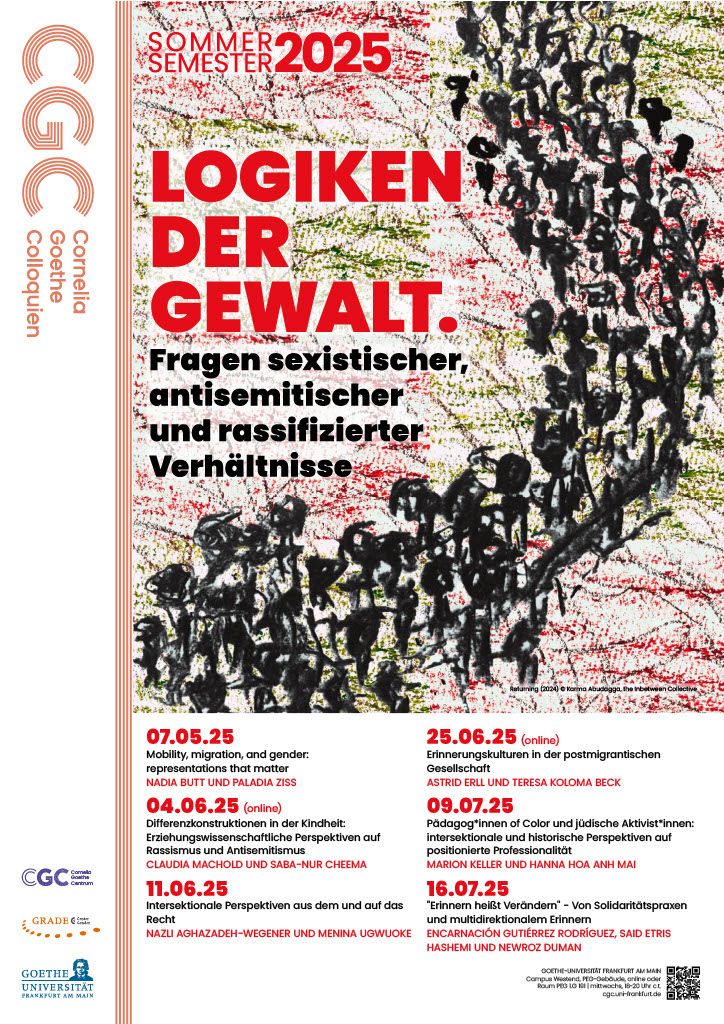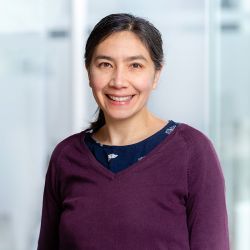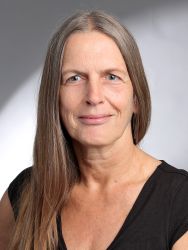
Room 1.G191
The room is accessible via elevators. There are two accessible restrooms on the first floor (1.G40s and 1.G40h).
On the same floor, there is an all-gender restroom (1.G40n) with both urinals and seated toilets. Additionally, there is a FLINTA* restroom (2.G40q) on the second floor, close to the CGC office rooms.
Hanna Hoa Anh Mai
Engaged Professionalism
The normality of racism is a social power relationship that also has an impact in educational work contexts. Educators of Color experience racism in their own field of work and must develop a professional way of dealing with it. The lecture will use interview excerpts with educators of color to show how experiences of racism and othering interact with professional self-conceptions. This involves both being positioned and creative appropriation processes of self-positioning. Following on from this, the concept of positioned professionalism is presented. With positioned professionalism, I describe professional knowledge, actions and self-images that educators of Color develop in confrontation with racist power relations, whereby it becomes clear that the presence and professional self-images of educators of Color can irritate existing power relations. This leads to the question of the possibilities of criticizing and changing racist relations. Expanding the understanding of pedagogical professionalism and viewing it as fundamentally positioned in the context of social power relations can reveal transformation potential for non-discriminatory and difference-sensitive pedagogical conditions.
Marion Keller
Against Antifeminism and Antisemitism: Jewish Activists Around 1900
At the beginning of the 20th century, the important Jewish activist Bertha Pappenheim (1859-1936) and her fellow campaigners from the “Weibliche Fürsorge” association opened several social institutions for Jewish girls and women in Frankfurt am Main. From 1901, these included the “Mädchenklub”, one of the first cultural centers for girls in Germany. At a time of increasing antisemitism, it was aimed at young people from poorer Jewish families and migrant women who had moved to Frankfurt from Eastern Europe as an empowering space and safe haven. The “Girls' Club” and the other female welfare facilities were at the beginning of professional social work. They existed for decades. After 1933, they managed to maintain their work under difficult conditions until their forced dissolution by the National Socialists in 1939. Pappenheim became internationally known as the founder of the Jewish Women's Movement and for her commitment to the fight against trafficking in girls and forced prostitution. In her time, it was still a question of being heard as a woman in a patriarchal order and as a Jew in a Christian majority society and being recognized as an expert.

Dr. Hanna Hoa Anh Mai is an educational scientist and works as a research assistant in the Democracy Promotion and Democratic Practice group at the German Centre for Integration and Migration Research (DeZIM). She wrote her doctoral thesis on experiences of racism and the professionalism of educators of color (PPädagog*innen of Color. Professionalität im Kontext rassistischer Normalität, Beltz Verlag, 2020). Her work focuses on racism-critical education, the scientific monitoring of projects in the field of anti-discrimination and democracy education as well as systemic process support.

Dr. Marion Keller works as a research assistant in the DFG-funded research project “Discourses on Trafficking in Girls in Modern Jewish Societies” at the Department of Jewish Studies at Goethe University Frankfurt am Main. Together with Prof. Dr. Rebekka Voß and the artist Elianna Renner, she has created the Bertha Pappenheim Map, an audio walk that follows in the footsteps of the Jewish feminist activist Bertha Pappenheim (1859-1936) and invites you to take a stroll through Jewish life in Frankfurt am Main around 1900.
This event takes place in German.
The CGC strives to make its events as accessible as possible. If you require assistance in order to participate in our event, please let us know your support needs by 11 June 2025 via email at: cgcentrum@soz.uni-frankfurt.de. We will then do our best to reduce any barriers within the scope of our capabilities. You are also welcome to attend this event with your children. If you would like us to arrange childcare, please contact us at the above email address at least one month before the event. We look forward to your participation.

